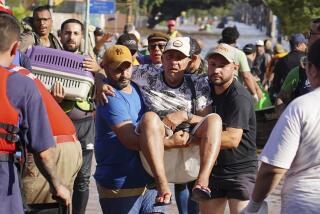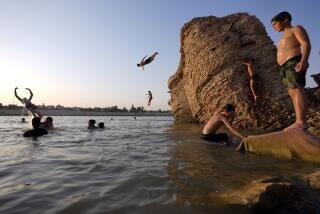Brazil’s Energy Rationing Aims to Cut Usage by 20%
- Share via
RIO DE JANEIRO — As Brazilians rushed to snap up power-saving light bulbs, candles and generators before the Friday start of energy rationing, government lawyers staffed the legal barricades Sunday in an effort to protect the plan.
Latin America’s largest country and biggest economy is in the grips of an acute electricity crisis and, under the government rationing plan, must reduce power consumption an average of 20% or face forced blackouts later this year.
Energy cuts for industry, commerce and homes are expected to brake economic growth, trigger layoffs, cut foreign investment and hurt Brazil’s trade balance.
The government has said that companies must cut power use by as much as 25%, and residents by as much as 20%. Almost 80% of Brazil’s 170 million residents are affected by the rationing, including those living in Brazil’s most populated regions. Starting June 1, there will be “zero tolerance” of violators, whose power could be cut for up to six days as punishment. Some residential violators could also face fines of up to 200% of their electricity rates.
At a meeting with consumers today, lawyers and the task force set up to overcome the crisis must convince the public to accept a decree that overrides consumer rights while rationing is in place.
That measure was meant to prevent a rising wave of lawsuits against the plan, which imposes surcharges and even blackouts on those who do not cut power use, but it only set off yet more court challenges.
President Fernando Henrique Cardoso last week signaled that the government may back off on the consumer rights issue, but some in the energy sector have said lack of determination by the administration may cost the country dearly.
They say forced outages would be much worse for the economy and people generally than semi-voluntary rationing. If the present rationing plan does not produce the desired effect in two to three months, the power cut needed to avoid an uncontrollable structural crisis would be double the 20% reduction.
Although the head of the task force, Cardoso’s chief of staff Pedro Parente, denied having any plans to impose a state of emergency in Brazil, Mines and Energy Minister Jose Jorge, has raised such a possibility in the future. A state of emergency would nullify consumer lawsuits and give the government unlimited power to tackle the crisis.
President Cardoso said in an interview published Sunday in the daily Jornal do Brasil that the country might stop functioning if it did not rain. But he added: “It won’t happen.”
Brazil’s worst energy crisis in at least three decades was triggered by droughts that dried up reservoirs at hydroelectric plants that provide 90% of the country’s electricity needs. But experts point to poor investment in the electricity sector and bad management as the main reasons for the crisis.
Cardoso again admitted that the government had not been ready to face the crisis, saying he himself was caught by surprise. But despite what the experts are saying, he insisted the drought was the main culprit.
“There is more than enough generation [capacity]. It’s a lack of water,” he said.
In the meantime, Brazilians are taking action. Consumption in May in the southeast--one of the worst-hit regions--has already fallen 8%.
Although that is partly due to people turning off air conditioners now that summer is over in Brazil, the change is apparent at night, when most homes are dark.
Newspapers and television programs endlessly explain how best to save energy, what appliances to switch off and what to do in case of a blackout. The sales of low-consumption light bulbs have soared and merchants are running out of power generators.
Even Cardoso’s residence and palace are affected.
“I ordered [the staff] to diminish internal lights, switch off refrigerators and swimming pool heating,” Cardoso said in the interview, although he added he always swims in cold water.
More to Read
Sign up for Essential California
The most important California stories and recommendations in your inbox every morning.
You may occasionally receive promotional content from the Los Angeles Times.













